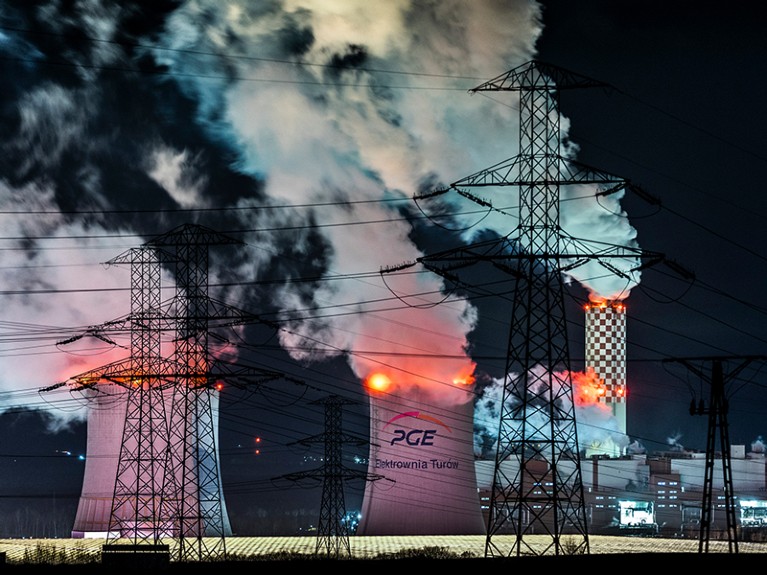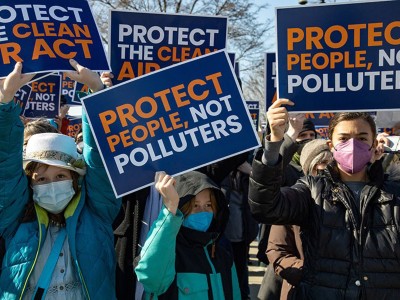
Poland is extending the operating licence for its Turów coal mine (pictured) until 2026. The mine is on the border with the Czech Republic.Credit: Florian Gaertner/Photothek/Getty
Last November’s 26th United Nations Climate Change Conference of the Parties (COP26) in Glasgow, UK, ended with a glimmer of hope. After two weeks of debate, nations inked an agreement, the Glasgow Climate Pact. This affirmed that, by 2030, carbon dioxide emissions must fall by 45% from 2010 concentrations if global warming is to be limited to 1.5 °C above pre-industrial levels.
As has historically been the case in global climate policy, European Union member states were out in front, pledging to cut emissions to at least 55% below 1990 levels in the next 8 years. This was an increase from a previous pledge of 40%. Since the 1990s, EU member states and the United Kingdom have adopted some of the world’s more ambitious climate targets. At the same time, Europe’s scientists, policy-makers and campaign groups have had a key diplomatic role in working with the United States and low- and middle-income countries (LMICs) to try to reach consensus on an issue on which opinions are exceptionally polarized. Now, the threat to Europe’s energy security from Russia’s invasion of Ukraine risks unravelling decades of hard work.
Sanctions on Russia are crushing global supplies of fossil fuels — one reason why energy prices are skyrocketing around the world. But these sanctions have also meant that Europe, once a big importer of Russian gas and oil, is now pulling every available fossil-fuel lever to keep the lights on. Whether reopening coal-fired power plants or upping oil imports, Europe’s governments aren’t keeping anything off the table.
US Supreme Court hobbles the EPA’s authority over climate emissions
What Europe needs to realize is that such a strategy carries multiple risks, for the planet and, more widely, for trust in the COP process. For decades, LMICs have argued that they need to be allowed to increase emissions so that everyone can benefit from the most basic amenities — just as households in high-income countries do. This is especially true for countries in Asia and sub-Saharan Africa where often a majority of the poorest households are not connected to water, gas or electricity networks. But many of Europe’s policymakers, researchers and campaign groups have urged LMICs to go directly to renewable energy rather than building energy systems around fossil fuels, and especially to avoid digging for coal.
They cite their own examples: the EU more than doubled its share of renewable-energy consumption from 9.6% of total energy in 2004 to 22.1% in 2020 without harming economic growth. Since 2012, coal-fired power has fallen by almost one-third. Ten countries, including Austria, Portugal and Sweden, were coal-free as of 2021. Another six, including France and Italy, have pledged to go coal-free in the next three years. And yet, since February’s invasion of Ukraine, Europe’s leadership (with a handful of exceptions, such as the European Parliament) has mostly been silent on its climate ambitions.
Europe needs to accept that it is not alone in experiencing precarious energy security — and that it now finds itself in the same position as other countries. Just as it is advising others to do, the continent’s leadership must prioritize renewable or low-carbon energy rather than automatically seeking to plug the energy gap with fossil fuels. If it fails to do so, the argument that LMICs must quickly decarbonize will be much harder to justify.
Trust between nations is once again wearing thin. One positive outcome for LMICs from the Glasgow talks was the promise to discuss ‘loss and damage’, a form of finance whereby historically high-emitting countries would compensate countries for any damaging effects from the former’s emissions. But one round of talks in Bonn, Germany, last month ended in effective stalemate.
With just four months to go before the next UN climate conference, COP27, takes place in Egypt, Europe needs a continent-wide plan to accelerate low-carbon forms of energy in the wake of Russia’s attack on Ukraine. Unless it can change its own energy stance in the coming months, any future call on LMICs to reduce greenhouse-gas emissions more quickly, or phase out coal, will ring hollow, and the world will be the poorer for it.

 US Supreme Court hobbles the EPA’s authority over climate emissions
US Supreme Court hobbles the EPA’s authority over climate emissions


